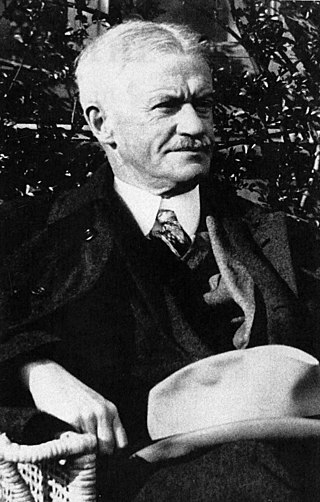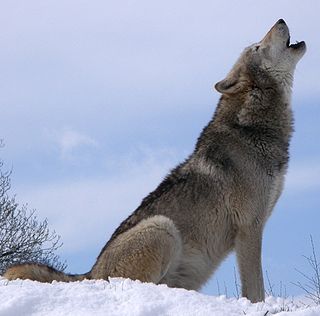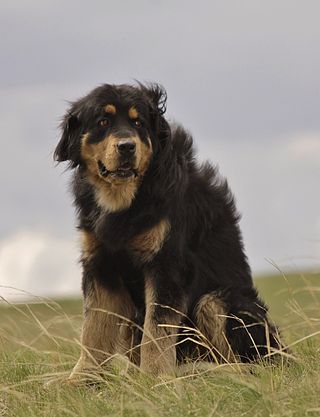Related Research Articles

The wolf, also known as the gray wolf or grey wolf, is a large canine native to Eurasia and North America. More than thirty subspecies of Canis lupus have been recognized, including the dog and dingo, though gray wolves, as popularly understood, only comprise naturally-occurring wild subspecies. The wolf is the largest extant member of the family Canidae, and is further distinguished from other Canis species by its less pointed ears and muzzle, as well as a shorter torso and a longer tail. The wolf is nonetheless related closely enough to smaller Canis species, such as the coyote and the golden jackal, to produce fertile hybrids with them. The wolf's fur is usually mottled white, brown, gray, and black, although subspecies in the arctic region may be nearly all white.

The cougar is a large cat native to the Americas. Its range spans from the Canadian Yukon to the southern Andes in South America and is the most widespread of any large wild terrestrial mammal in the Western Hemisphere. It is an adaptable, generalist species, occurring in most American habitat types. This wide range has brought it many common names, including puma, mountain lion, catamount and panther. It is the second-largest cat in the New World, after the jaguar. Secretive and largely solitary by nature, the cougar is properly considered both nocturnal and crepuscular, although daytime sightings do occur. Despite its size, the cougar is more closely related to smaller felines, including the domestic cat than to any species of the subfamily Pantherinae.

Albert Jay Nock was an American libertarian author, editor first of The Freeman and then The Nation, educational theorist, Georgist, and social critic of the early and middle 20th century. He was an outspoken opponent of the New Deal, and served as a fundamental inspiration for the modern libertarian and conservative movements, cited as an influence by William F. Buckley Jr. He was one of the first Americans to self-identify as "libertarian". His best-known books are Memoirs of a Superfluous Man and Our Enemy, the State.
Dog intelligence or dog cognition is the process in dogs of acquiring information and conceptual skills, and storing them in memory, retrieving, combining and comparing them, and using them in new situations.

Dog training is the application of behavior analysis which uses the environmental events of antecedents and consequences to modify the dog behavior, either for it to assist in specific activities or undertake particular tasks, or for it to participate effectively in contemporary domestic life. While training dogs for specific roles dates back to Roman times at least, the training of dogs to be compatible household pets developed with suburbanization in the 1950s.

Timothy Ferris is an American science writer and the best-selling author of twelve books, including The Science of Liberty (2010) and Coming of Age in the Milky Way (1988), for which he was awarded the American Institute of Physics Prize and was nominated for the Pulitzer Prize. He also wrote The Whole Shebang: A State-of-the-Universe(s) Report (1997), a popular science book on the study of the universe. Ferris has produced three PBS documentaries: The Creation of the Universe, Life Beyond Earth, and Seeing in the Dark.

A pack is a social group of conspecific canines. Packs aren't formed by all canines, especially small sized canines like the Red fox. The number of members in a pack and their social behavior varies from species to species. Social structure is very important in a pack. Every pack member will have a position and a role to play. Canine packs are led by a breeding pair, consisting of the alpha male and the alpha female.
The alpha roll is a dog training technique that is considered outdated by many modern-day dog trainers. The theory behind the training method is that dogs are hierarchical animals. The technique is used to teach the dog that the trainer or owner of the dog is the pack leader. Methods include when a dog misbehaves to pin the dog on its back and held in that position, sometimes by the throat.
The dog is a domesticated descendant of the wolf. Also called the domestic dog, it is derived from the extinct Pleistocene wolf, and the modern wolf is the dog's nearest living relative. Dogs were the first species to be domesticated by hunter-gatherers over 15,000 years ago before the development of agriculture. Due to their long association with humans, dogs have expanded to a large number of domestic individuals and gained the ability to thrive on a starch-rich diet that would be inadequate for other canids.

César Felipe Millán Favela is a Mexican-American dog trainer. He is widely known for his Emmy-nominated television series Dog Whisperer with Cesar Millan, which was produced from 2004 to 2012 and is broadcast in more than 80 countries worldwide.

The domestication of the dog was the process which created the domestic dog. This included the dog's genetic divergence from the wolf, its domestication, and the emergence of the first dogs. Genetic studies show that all ancient and modern dogs share a common ancestry and descended from an ancient, now-extinct wolf population – or closely related wolf populations – which was distinct from the modern wolf lineage. The dog's similarity to the grey wolf is the result of substantial dog-into-wolf gene flow, with the modern grey wolf being the dog's nearest living relative. An extinct Late Pleistocene wolf may have been the ancestor of the dog.

Mark Rowlands is a Welsh writer and philosopher. He is Professor of Philosophy at the University of Miami, and the author of several books on the philosophy of mind, the moral status of non-human animals, and cultural criticism. He is known within academic philosophy for his work on the animal mind and is one of the principal architects of the view known as vehicle externalism, or the extended mind, the view that thoughts, memories, desires and beliefs can be stored outside the brain and the skull. His works include Animal Rights (1998), The Body in Mind (1999), The Nature of Consciousness (2001), Animals Like Us (2002), and a personal memoir, The Philosopher and the Wolf (2008).

Wayne Pacelle is one of the leading contemporary animal advocates, having founded or led a set of major animal rights organizations, negotiated agreements on animal rights with major American companies, and helped conceive of and pass statewide ballot measures and federal laws. He is also a two-time New York Times best-selling author.
Canine Companions for Independence is a US-based 501(c)(3) nonprofit organization that trains and provides assistance dogs. As of 2018, it has placed over 6,000 assistance dogs with recipients at no charge.

A free-ranging dog is a dog that is not confined to a yard or house. Free-ranging dogs include street dogs, village dogs, stray dogs, feral dogs, etc., and may be owned or unowned. The global dog population is estimated to be 900 million, of which around 20% are regarded as owned pets and therefore restrained.

This is a bibliography of U.S. congressional memoirs by former and current U.S. senators.
The Fredericksburg Dog Mart is an annual dog show event currently held in Spotsylvania County, Virginia. The event first took place in 1698 to facilitate trading between the Manahoac Tribe of King William County, Virginia and settlers in and around the area that would become the city of Fredericksburg. At the Dog Mart, the Manahoac would trade furs and produce for prized English hunting dogs. Though it has not been held continuously, it is the oldest event of its kind in the United States.
Becerrillo or Bezerrillo was the name of a Castilian attack dog during the time of the Spanish conquistadors.

Howling is a vocal form of animal communication seen in most canines, particularly wolves, coyotes, foxes, and dogs, as well as cats and some species of monkeys. Howls are lengthy sustained sounds, loud and audible over long distances, often with some variation in pitch over the length of the sound. Howling is generally used by animals that engage in this behavior to signal their positions to one another, to call the pack to assemble, or to note their territory. The behavior is occasionally copied by humans, and has been noted to have varying degrees of significance in human culture.

The Bankhar dog, is a landrace livestock guarding dog. Originally bred by the Buryat people, their success contributed to their spread across Buryatia and Mongolia and into adjacent regions before they were nearly annihilated in the mid-20th Century. Bankhar dogs are prized for their intellect and perseverance even in hostile weather conditions. They are loyal and affectionate with their families, but formidable against intruders, including humans, wolves, eagles and snow leopards.
References
- ↑ Pierotti, R.; Fogg, B. (2017). The First Domestication: How Wolves and Humans Coevolved. Yale University Press. p. 43. ISBN 978-0-300-22616-4.